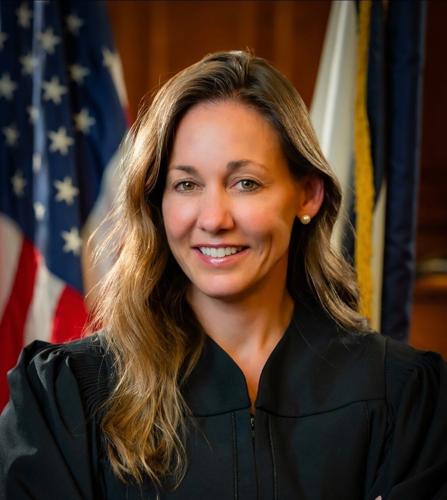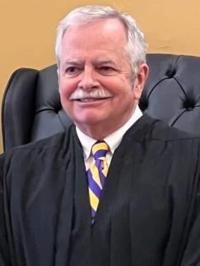
CHARLESTON – Two circuit court judges have been admonished for what they said while speaking to the media about child welfare cases.
In separate June 12 rulings, the state Judicial Investigation Commission admonished Kanawha Circuit Judge Maryclaire Akers and Pleasants Circuit Judge Tim Sweeney.

Akers
In the Akers matter, the state Judicial Disciplinary Counsel opened a complaint on her on March 24. Akers replied through her attorney April 25 and by email May 13.
Akers had presided over an abuse and neglect case involving a minor. Akers learned the 12-year-old had attempted suicide after being placed in a hotel when a foster placement didn’t work out. She then entered an administrative order calling for the secretary of the state Department of Human Services to come before her to discuss the situation.
When the secretary appeared for the February 28 hearing, there were about 150 other participants in the courtroom or attending remotely. Several members of the press also were in attendance, and Akers recognized the press by saying, “We have the media here, whose job it is to shine a light on all of us.”
That evening, Akers was seen and heard in a WSAZ television story about the hearing commenting from the bench, and she was quoted in a written WSAZ news story and a West Virginia MetroNews story about the hearing. She also appeared on a MetroNews radio talk show on March 3 to discuss the matter.
“There are lots of rules that govern what I can say publicly,” Akers said on MetroNews’ Talkline program. “So, if you guys ask me questions that I’m not allowed to answer, I’ll tell you. That is because we have rules that apply to this judiciary. I’m happy to come on here, and some of them I may not be able to answer. But what I can tell you is what I said in my orders and what I said in open court.”
In the admonishment, the JIC takes issue with Akers’ comments regarding her previous work as a Kanawha County prosecutor.
“Well, you know, I was a prosecutor for a long time,” Akers said on Talkline. “I was a prosecutor for over 20 years. I started out as a juvenile prosecutor. I was a grant prosecutor hired by Bill Forbes, and what I did was dealt with juvenile defenders in the very beginning. That was back in, gosh, 1999. And then I did felonies. Eventually I was just trying murder cases there and doing that for a long time.
“But what I did see that abuse and neglect is the entry point into this system for a lot of people. The children are put into this system for a lot of people. The children are put into this system, they may or may not find permanent placement. Sooner or later, they may have contact with the juvenile justice system, and then they wind up kind of turning in there and then they turn 18, and they may have an adult offense, and then they wind up in our adult courts. So I’ve seen this for a long time.”
While her history as a prosecutor is included in her court bio, the JIC said “it was not detailed to the extent it was in her statement to MetroNews and the (above paragraph) was not contained anywhere in the order or hearing.”
Akers argued that she didn’t say anything that wasn’t in the order or said during the hearing.
By a 7-1 vote, the JIC said it found probable cause that Akers violated four rules of the Code of Judicial Conduct regarding compliance with the law, confidence in the judiciary, judicial statements on pending and impending cases and extrajudicial activities in general.
The JIC said formal discipline wasn’t necessary because Akers has a reputation for being a good judge, cooperated with the investigation and had no prior discipline.
“The commission is not unmindful that respondent (Akers) was trying to do something good for children who suffer as a result of abuse and/or neglect,” the admonishment states. “However, as Herodotus once said, ‘Great deeds are usually wrought at great risk.’ …
“The fact remains that respondent cannot talk to the media about pending matters whether it be tied to the underlying case involving the 12-year-old or the one-year monitoring of DoHS.”
The JIC says Akers’ argument that she can talk to the media as long as she doesn’t stray from the contents of an order or what is said during a hearing is “impractical and unworkable.” It also says judges sometimes “can say something in an order or at a hearing that still violates the code.”
“Talking to the news media is not an official duty,” the admonishment states. “Even if respondent’s argument was correct, which it is not, she did stray outside what was in the order/hearing …
“By making such a statement, respondent created in the mind of the public, however wrong it may be, the perception that children in the abuse and neglect system wind up as juvenile delinquents and/or adult criminals which is contrary to the requirement that a judge must appear neutral and detached.
“As careful as Judge Akers tried to be, her defense is flawed. While we applaud the fact that respondent tried to abide by what she believed was right, she violated the code.”

Sweeney
In the Sweeney matter, he held an abuse and neglect hearing in October 2024 involving a minor who had been severely traumatized. He ordered the child to be placed in an out-of-state treatment facility, but the case fell through the cracks. At a February 3 hearing, Sweeney wanted to know why Child Protective Services had not yet sent the child to placement.
At the hearing, a local CPS worker said they were severely overworked and understaffed. That caused them to have to prioritize cases based on who was safe and who wasn’t by way of threat assessment. One worker said the worker assigned to this case had 100 families in her caseload when the average should be no more than 10.
Sweeney said DoHS had “failed grossly” in looking out for children, and he discussed the process of civil contempt.
“I think that it is unfortunate, and I’m loathe to get into managing the department, what it does, its employees and whether they do their job,” Sweeney said. “However, I think it probably falls upon me to make sure that happens because probably the buck stops here. …
“Maybe we need the commissioner’s name so that I can sign a civil contempt order today to require the commissioner to be incarcerated until this situation is rectified. Well, to do that, I would have to get them here, which could be done. Then maybe that would bring it to the attention of the folks in Charleston. Maybe if it gets in the Charleston Gazette and on MetroNews and in various news feeds, the Legislature might recognize something and realize this is a situation that needs to be addressed.”
Sweeney ordered the parties back for a February 20 hearing to “enter a placement order which speaks for itself to become part of the record in this proceeding to address the matters that have been discussed today.”
In a separate order that day, Sweeney ordered members of the DoHS to appear in court “personally, under penalty of contempt” on February 20 “to receive their case assignments” as CPS workers, removal workers, case workers, “court workers,” etc.
Sweeney admitted to contacting a reporter for The Parkersburg News and Sentinel on February 4 and providing him with a copy of the order and giving an interview. The article appeared in the February 5 newspaper before anyone named in the order had received it. He also talked to MetroNews and The West Virginia Record about the order.
The JIC opened a complaint February 10 against Sweeney alleging he failed to properly provide the DoHS workers with notice and an opportunity to be heard before ordering them to work and that his media interviews were improper. Sweeney provided a sworn statement May 21 to the JDC with his attorney present.
In the statement, Sweeney denied any impropriety with respect to the media interviews. He said he didn’t think he had released any information from an abuse and neglect case, which are confidential. He said he went to the media to “call attention to the issue.”
By a 7-1 vote, the JIC said Sweeney violated five rules of the Code of Judicial Conduct regarding compliance with the law, confidence in the judiciary, judicial statements on pending and impending cases and extrajudicial activities in general as well as participation in charitable, fraternal or civic activities regarding some unrelated posts that he has since removed from social media.
The JIC said formal discipline wasn’t necessary because Sweeney had a reputation for being a good judge, had cooperated in the investigation and had no prior discipline.
“The commission is not unmindful that respondent was trying to do something good for both the children and local DoHS workers when he initiated attempts to correct understaffing in his jurisdiction,” the admonishment states. “As the old saying goes, ‘A good deed is never lost.’ Moreover, ‘every time you do a good deed, you shine the light a little farther into the dark’ as was done in this case.
“Nonetheless, respondent used his flashlight in the wrong manner to achieve the right result. He should have issued a rule to show cause and brought the DoHS officials before him in court to address the matter thereby insulating his comments … since they occurred during the course of his official duties. …
“The commission is of the belief that but for the confidential hearing, the news interviews would never have taken place. Even if we were to agree, which we do not, that the DoHS order was not related to the hearing, respondent scheduled a comeback date for the DoHS officials to appear in court under penalty of contempt.
“At the time he talked to the news media, respondent did not know that the matter would resolve. The DoHS could have filed a writ against the judge, sought injunctive relief or simply not shown up and respondent would then have been obliged to hold them in contempt.
“Thus, either way, there was a pending matter before the court at the time he spoke to the news media.”
Sweeney said he disagrees with the admonishment.
“I’m just trying to protect children,” he told The West Virginia Record. “I’m disappointed that it is not, in my opinion, being properly recognized. I respect the JIC and their opinion.
“At this point, I’m just weighing my options. But I will continue to do what I can to protect children.”
Judicial Investigation Commission of West Virginia complaint numbers 35-2025 (Akers) and 13-2025 (Sweeney)










